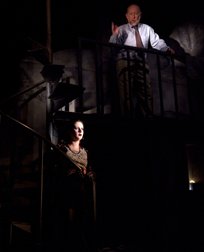In his recent review of Andrew Lloyd Webber’s Love Never Dies, critic Ben Brantley compares the modern musical to something like a theatrical amusement park ride. No one goes to them looking for finely detailed acting or a subtle drawing of the complexity of human relationships; they go to them because the chandelier falls at the end of the first act to the titillating swell of a live orchestra. Musical theatre is now synonymous with repetitive melodies, synthesized emotion, and the implacable beat of drum machines. This tends to be what audiences can expect from their musicals and what they’re usually, and unfortunately, given. And it’s precisely this image of the musical theatre genre that Bernie McGill and Paul Boyd’s The Haunting of Helena Blunden is aiming to replicate. This is a shame, considering that what Big Telly Theatre Company’s production could have offered us was a simple but compelling story about a Belfast family with a hidden legacy, told with honesty and integrity by a talented cast.
As she searches for clues to her family’s past in her grandfather’s abandoned linen mill, twenty-something Susan is confronted with the ravings of the elderly Maggie, a recent hospital ward escapee drawn back to the mill by the mysterious haunting by one of her former co-workers, the spectral Helena Blunden. Heard only by Maggie, the younger spirit of Helena reveals the sordid history penetrating the mill itself, where her affair with Susan’s grandfather produced an illegitimate child, who was apparently killed one night in World War Two, during a bombing raid on Belfast. Completing the quartet is Susan’s estranged dad Michael, who arrives from his father’s deathbed to uncover and ultimately destroy the evidence of his father’s impropriety. How all four characters are destiny-bound is revealed soon enough in a series of sung flashbacks and the eerie, amplified exchanges between Maggie and her tormenter Helena.
 The subject matter is appropriately gothic (illegitimate children dying under mysterious circumstances, hidden graves, decaying sites of past wrongs humming with spiritual activity), and under Zoë Seaton’s straightforward direction the basics of the narrative fall neatly into place. In fact, they fall so neatly into place it’s possible for an audience member to see a twist or turn in the story coming a good one or two songs before the characters experience the revelations themselves. This unintended dramatic irony robs the piece of the jolts it wishes to achieve through the familiarly creepy strains of composer Paul Boyd’s synthesized themes, the shadowy reveals of the ghostly Helen, and the generally ragged setting of the abandoned mill. The musical numbers, while competently composed and sung, at times border on camp, serving up obligatory character development and exposition rather than expressing a heightened state of emotion that grows organically out of the given circumstances. This is evidenced by the numerous instances that the actors, while in the midst of a dramatic exchange with their scene partner, are forced to wait awkwardly for a moment or two as their song’s lead-in comes, thus diffusing any dramatic tension achieved.
The subject matter is appropriately gothic (illegitimate children dying under mysterious circumstances, hidden graves, decaying sites of past wrongs humming with spiritual activity), and under Zoë Seaton’s straightforward direction the basics of the narrative fall neatly into place. In fact, they fall so neatly into place it’s possible for an audience member to see a twist or turn in the story coming a good one or two songs before the characters experience the revelations themselves. This unintended dramatic irony robs the piece of the jolts it wishes to achieve through the familiarly creepy strains of composer Paul Boyd’s synthesized themes, the shadowy reveals of the ghostly Helen, and the generally ragged setting of the abandoned mill. The musical numbers, while competently composed and sung, at times border on camp, serving up obligatory character development and exposition rather than expressing a heightened state of emotion that grows organically out of the given circumstances. This is evidenced by the numerous instances that the actors, while in the midst of a dramatic exchange with their scene partner, are forced to wait awkwardly for a moment or two as their song’s lead-in comes, thus diffusing any dramatic tension achieved.
That said, Helena Breen as Maggie carefully treads the line between lost soul and caricatured crazy woman, infusing her performance with an eerie charm all the way through to its chilling climax. As the wronged daughter Susan, Charlotte McCurry is sympathetic without being maudlin, and she expertly handles what could potentially have been an absurd number about Susan as a youngster cutting herself for emotional release. As her father Michael, Karl O’Neill elicits just the right amount of compassion in his portrayal of a man trying desperately to hold on to what little family he has left. Roisin Gallagher combines a genuine naïvety with carefully measured doses of menace in her performance as the tormenting and tormented Helen.
What undermines these compelling performances, though, is an insistence on mimicking the brashness of the modern musical through the use of prerecorded, digitized music, robbing the story of its weight and emotional impact. If Seaton’s team had worked in a subtler way with live musicians, a more intimate setting that resisted two-dimensional staging, and a score that was driven by the story rather than manipulating it, the result would have been far more engrossing. Obviously, from the point of view of dealing with limited resources, touring a group of musicians along with the rest of the production may not have been a possibility. Nonetheless, the result is a show that puts its faith in the falsities of small-scale, artificial spectacle, while abandoning substance in the process.
Jesse Weaver is currently in his final year of doctoral research at University College Cork. His focus is on the shifting role of the playwright in Irish theatre-making during the last fifteen years.